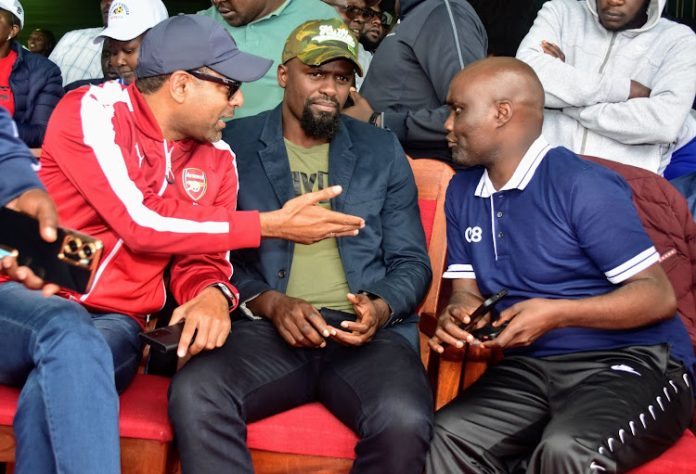Hussein Mohammed, the FKF presidential hopeful and CEO of Extreme Sports, is taking a bold stance in calling for reforms ahead of the upcoming Football Kenya Federation (FKF) elections.
As a prominent figure in Kenyan football, Mohammed is determined to ensure that the electoral process is free, fair, and transparent. He insists on key changes that will promote integrity and restore the confidence of stakeholders in the management of Kenyan football.
With the FKF elections set to take place before December 15, 2024, Mohammed is adamant that these changes are necessary to safeguard the future of the sport in Kenya.
In this article, we explore Mohammed’s key concerns, the reforms he is advocating for, and how these changes could reshape the landscape of football governance in the country.

At the heart of Mohammed’s concerns is the need for transparency in the electoral process, with a particular emphasis on the voter register.
According to Mohammed, the voter register must be made public, transparent, and safeguarded from tampering.
This, he argues, is the only way to ensure that the process is free from manipulation and that every eligible voter has a fair say in electing the future leaders of Football Kenya Federation.
ALSO READ:
- Football Kenya Federation (FKF) Unveils Electoral Board to Oversee Upcoming Elections by End of 2024
“The voter register must be made public, transparent, and safeguarded from tampering to ensure that every eligible voter has a fair say in this election,” Hussein Mohammed said.
This demand underscores his commitment to creating a level playing field where all stakeholders can participate in an honest and credible election.
Independence of the FKF Electoral Board
In addition to transparency, Hussein Mohammed has raised concerns about the FKF Electoral Board’s independence. He recommends that the board operates from a neutral location, entirely detached from Kandanda House. This, he believes, will ensure that the election process is not influenced by any FKF officials who may have vested interests in the outcome.
By advocating for a neutral operating base, Mohammed seeks to create a truly independent electoral board that can act impartially and ensure the integrity of the election. “The independence of the board is crucial. They should operate from a location that is neutral to avoid any possible interference,” Mohammed remarked.

Another key demand from Hussein Mohammed is the involvement of the Independent Electoral and Boundaries Commission (IEBC) in overseeing the FKF elections. He believes that the IEBC has the technical expertise and impartiality necessary to conduct a credible election.
“We strongly urge the FKF Electoral Board to engage the IEBC in this process. Their experience in handling elections can guarantee professionalism and fairness,” Mohammed said. By involving the IEBC, Mohammed is looking to leverage their electoral experience to ensure that the process is conducted transparently, devoid of bias, and in line with best practices.

One of the most critical aspects of Mohammed’s reform agenda is his call for grassroots dispute resolution. He insists that all voter register disputes and electoral grievances should be resolved where they originate, rather than in Nairobi. This approach, he believes, will empower local football stakeholders and ensure that their concerns are addressed fairly and promptly.
By decentralizing dispute resolution, Hussein Mohammed is advocating for a more inclusive and accessible approach to governance. Local football stakeholders will have a stronger voice, and the electoral process will reflect the diversity and complexity of Kenyan football at the grassroots level.
Compliance with the Sports Act 2013 and the Constitution of Kenya 2010
In his push for reforms, Hussein Mohammed has also emphasized the need for the FKF Electoral Board to comply fully with the Sports Act 2013 and the Constitution of Kenya 2010. He argues that these legal frameworks provide a solid foundation for fair and credible elections, and adherence to them is crucial to maintaining the legitimacy of the process.
“The board must ensure compliance with the law. This is the only way we can guarantee that the elections will be conducted in a manner that is free, fair, and credible,” Hussein Mohammed noted.

To enhance accessibility and ensure fairness, Hussein Mohammed is calling for polling stations for branch grassroots elections to be located at county headquarters.
According to him, this will allow football delegates and voters to participate in the election process without facing unnecessary logistical challenges or intimidation.
By situating polling stations in county headquarters, Hussein Mohammed aims to create an environment where grassroots stakeholders can vote freely and without the influence of powerful factions within the federation.
This decentralization of polling stations is another way Mohammed hopes to make the electoral process more inclusive and transparent.
Holding the FKF Electoral Board Accountable
While Hussein Mohammed has expressed his commitment to supporting the FKF Electoral Board, he has also made it clear that he will not hesitate to hold them accountable if they fail to adhere to the principles of transparency, fairness, and integrity. “We will not hesitate to hold the board accountable if they fail to deliver a transparent and credible election,” Mohammed warned.
The future of Kenyan football, according to Hussein Mohammed, depends on a credible election. He is committed to ensuring that the process is conducted in a way that respects the will of all football stakeholders in the country.


